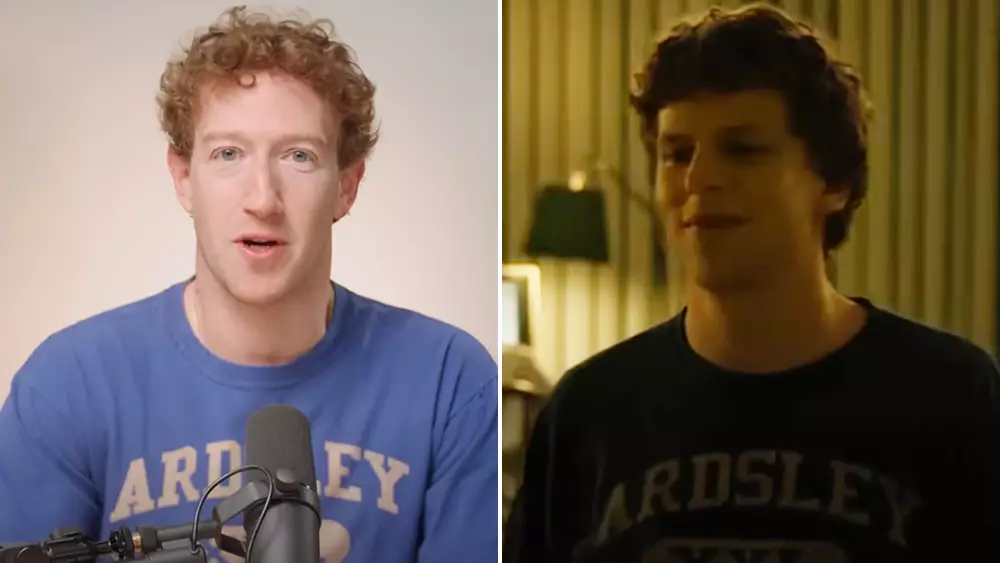The world of cinema often blurs the lines between reality and fiction, illuminating the complexities behind historical figures and contemporary icons. Jesse Eisenberg’s portrayal of Mark Zuckerberg in “The Social Network” serves as a striking example of this crossover. While Eisenberg may consciously distance himself from the figure he’s brought to life, Zuckerberg seems to revel in this association. The dichotomy between their perceptions highlights the often-unseen effects of cinematic narrative on real lives—a phenomenon that opens doors for intriguing dialogues and unexpected relationships.
Zuckerberg’s Gesture: A Symbol of Connection
In a revealing moment on “The Colin and Samir Show,” Zuckerberg disclosed an amusing anecdote: he purchased an iconic shirt worn by Eisenberg in the film. This wasn’t merely an act of homage; it communicated a deeper need for connection tied to a character that, whether through praise or criticism, has become part of Zuckerberg’s identity in popular culture. The auction acquisition, fluctuating between $2,000 and $4,000, transcends mere memorabilia and ventures into a territory where the past and present intertwine. It raises numerous questions about how individuals embrace, reject, or even commodify the narratives surrounding them.
Eisenberg’s Reluctance: An Actor’s Discomfort
While Zuckerberg embraces the connection with a sense of humor, Eisenberg appears more ambivalent. During a recent appearance on BBC Radio 4, he expressed his desire to distance himself from Zuckerberg’s persona, fearing the implications of that association. Eisenberg’s sentiment reflects a common dilemma faced by artists: the fear of being pigeonholed into the roles they portray. His remark about not wanting to be associated with “someone like that” hints at a quest for individuality that is at odds with the commercial and public expectations placed upon him. This disconnection poses a question: how do artists navigate the territory where their craft meets public perception?
The Evolving Narrative of Public Figures
Zuckerberg’s purchase also stands as a testament to the evolving narrative that public figures face in the age of social media and digital storytelling. By acquiring a piece of fiction that represents himself, Zuckerberg subtly acknowledges the influence of storytelling on his identity. This gesture marks an attempt to reclaim a narrative often skewed by public opinion and media portrayal. As the creator of a platform that significantly impacts how we communicate and perceive one another, his actions might be viewed as an effort to control a story that, in many ways, has spiraled beyond his grasp.
The Cultural Dichotomy and Its Implications
This interaction between Eisenberg and Zuckerberg encapsulates the cultural dichotomy we face today—where art and life are seamlessly intertwined. The two men, though linked by a film, embody contrasting relationships with identity, fame, and public scrutiny. For Zuckerberg, embracing this cultural artifact signifies a light-hearted acceptance of his dual persona as both tech mogul and flickering public character. Conversely, Eisenberg’s reluctance to engage suggests a protective instinct, urging us to consider how roles can follow actors into their lives, leaving lasting imprints that shape public discourse.
In a world where narratives mold perceptions and influence reality, the delicate interplay between Eisenberg and Zuckerberg creates a fascinating tapestry that reflects broader societal themes of identity, meaning, and the constructs we inherit or reject.

